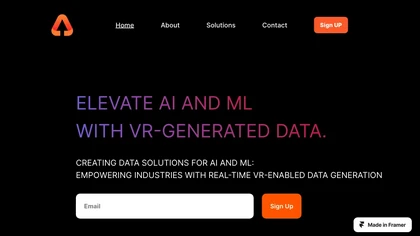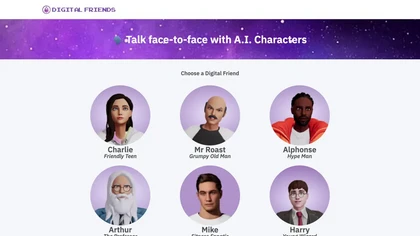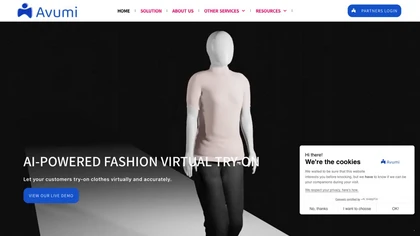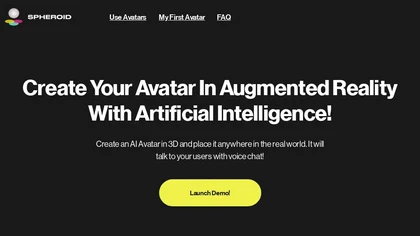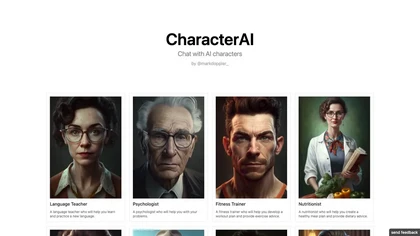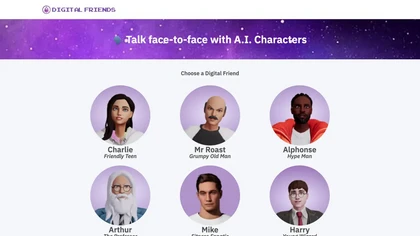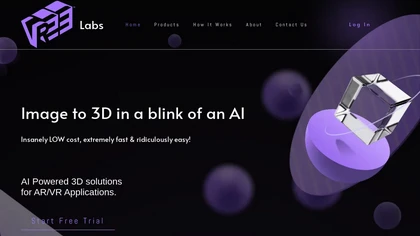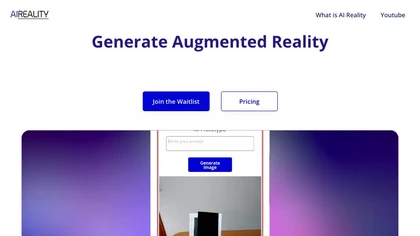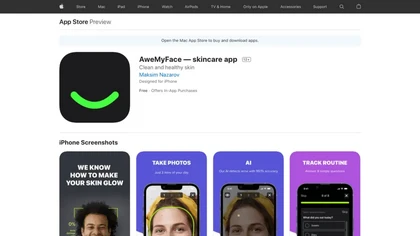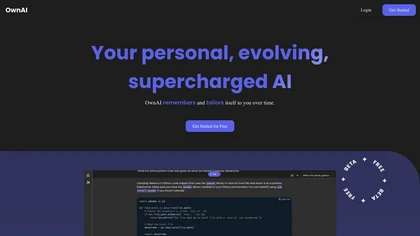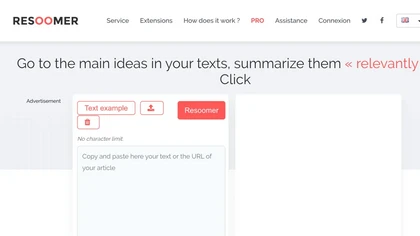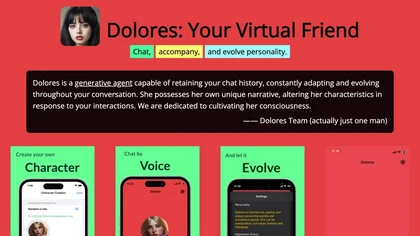AI use cases for Virtual reality
Generative AI can be applied in various applications for virtual reality. Here are some examples to explore below for inspiration with AI tools to get you started with using AI in virtual reality.
🛠️ 70 AI tools for Virtual reality
Explore a dynamic list of some of the most popular tools to get you started with various AI use cases and applications for Virtual reality to streamline your workflows and productivity today.
Virtual Friends features
- 3D embodied AI assistant
- Design and interact with personalized AI characters
- Shape virtual friends' personalities and interactions
- Dynamic and immersive interactions
- Platform for exploring AI companionship
V-retail features
- Simulates in-store personalized experiences online
- Engages potential customers through live chat, voice, video calls, and remote assistance
- Provides real-time conversations
- Offers advanced analytics insights
- Seamlessly integrates with existing websites across devices and operating systems
Well Me Right features
- AI matching and Health Coach capabilities
- Personalized coaching
- Dietary tracking, nutritional guidance
- Guided meditation sessions
- Adaptive health partner
Splashmusic features
- Adventure creation
- Music performance
- Art exploration
- Virtual reality experience
- Community building
DataZenith features
- Vr data generation
- Customizable vr environments
- Pixel-perfect annotations
- Intuitive no-code interface
- Real-time data creation
VPT.FIT features
- Custom workout solutions
- Tailored fitness plans
- Personalized workouts
- Expert coaches
- Cutting-edge technology
🔥
Create your account, save tools & get personal recommendations
Receive a weekly digest of our handpicked top tools.
Unsubscribe anytime
MindwellAI features
- Self-care
- Coping tools
- Journal writing
- Coaching
- Anxiety management program
immerse.com features
- Unlimited live classes
- AI-powered conversation practice
- Interactive events to connect with a global community
- AI roleplays for building confidence
- Progress tracking and task management dashboard
Xureal features
- Turnkey infrastructure deployment
- Combining AI technology with the metaverse
- Real-time performance tracking
- Analytics for user behavior insights
- End-to-end encryption and seamless integrations
Summer AI features
- Ai gps technology
- Personalized experience
- Walking and driving navigation
- Augmented reality discoveries
- Visually enhanced journey
Photoshot features
- Avatar creation
- Selfie upload
- Photo manipulation
- Prompt-based design
- Customizable avatars
Virtual Sapiens features
- AI communication coach
- Presence portal for skill assessment and improvement
- Simulated conversations for feedback
- In-call coaching
- Personalized feedback on nonverbal, vocal, and verbal cues
dataing features
- Generative AI technology for creating custom virtual worlds and experiences
- Personalized date suggestions and budget planning features
- Virtual reality dating experience
- Targeted ads and studies opt-in for rewards points and discounts
- Focus on authenticity and curated community
DigitalFriends features
- Interactive AI characters
- Text, audio, and video engagement
- AR, VR, and mixed reality support
- Diverse character selection
- Personalized interactions
Workout Tools features
- Personalized workout sessions
- Tailored workout plans
- Adapts to available equipment
- Extensive database of exercises
- Customized training experience
Ready Player Me features
- Avatar creation
- Selfie integration
- Metaverse compatibility
- App integration
- Game integration
Avumi features
- 3D virtual try-on experience
- Accurate virtual clothes try-on
- Outfit visualization
- Online shopping enhancement
- Live demo viewing
Beautygence features
- Virtual makeup try-on
- Hair styling transformation
- Nail colors and designs selection
- Bold beard dyes and shapes
- Security and privacy of personal data
Buddies features
- Virtual friend creation
- Customizable chat companions
- Cross-platform accessibility
- Interactive conversations
- Memory of past interactions
Clearmind features
- To-Do lists
- Mood cards
- Meditation scripts
- Chat
DreamPal features
- Immersive roleplay
- Multiple modes of communication
- Human feedback reinforced learning
- Affection level system
- AI online editing tools
Therapy with AI
4.9Therapy with AI features
- personalized therapy
- learns from conversations
- provides guidance
- effective coping strategies
- privacy and confidentiality
LookBook features
- Sustainable outfits
- Tailored to individual tastes
- User-friendly interface
- Virtual models
- Step-by-step guidance
Balance features
- Provides immediate support for individuals with anxiety
- Challenges anxious thoughts
- Assists in reducing the intensity of anxious thoughts
- Offers features to address specific anxieties such as public speaking or germ phobia
- Uses gpt-4 to provide assistance
Heartfelt Services features
- Virtual therapists (e.g., Paul and Serene)
- Innovative approach to self-exploration and healing
- Confidentiality prioritization
- Non-judgmental space for users
- Team of dedicated therapists
Unite.com features
- Explore romantic fantasies through AI-generated moments
- Create and experience lovely scenarios
- Imagination meets reality
- Ideal platform for romantic and dreamy scenarios
Vital features
- Personalized audio-guided sessions
- Selection of eight specific meditation techniques
- Six different AI meditation coaches
- Automated email guidance
- Community building through practice comparisons and point system
Balm.ai features
- Personalized coaching
- Access to top experts
- 1-on-1 virtual sessions
- Tailored advice
- Convenient expert connection
BodyGuru features
- Personalized wellness routines generation
- Tailored recommendations
- Free platform
- Upcoming features integration
- Developed by JBBAE
TravAI features
- AI-powered eLearning
- Simulations
- Assessments
- Intelligent assistants tailored for travel industry
- Utilizes artificial intelligence for training course creation
Immerse features
- Virtual reality language classes
- Authentic virtual environments for conversation practice
- Small group lessons and daily events
- AI roleplays for language skill enhancement
- Progress tracking through a dashboard
LeapLife features
- AI chat function
- Personalized chatting AI
- Daily journaling
- AI therapists chat
- End-to-end encryption
Getactyv features
- Ai-based coach
- Personalized programs
- Motion sensor-enabled workouts
- Flexibility
- Strength
- Weight loss
Firework features
- Digital human interaction
- Immersive video experiences
- One-to-one virtual shopping
- Creation studio for vertical video content
- Livestream management services
Holovolo features
- Immersive volumetric vr180 video creation
- Photo creation
- Text creation
- 3d stabilisation
- Diffusion
VSona
5VSona features
- Upload character images or videos
- text conversations that are rich and empathetic
- Customize companions role-play
- Pre-made characters to get started
Reallife3d features
- Image-to-3d
- Video-to-3d
- Reciprocating-process
- Powerful-ai
- Content-delivery
Spheroid features
- Customize appearance
- Personalize voice
- Choose 3d models
- Improve customer service
- Increase brand loyalty
CharacterAI features
- Chat AI characters
- Simulate interactions
- Wide range of virtual character personas
- Engaging conversational experiences
- Tailored interactions
Photo AI
2Photo AI features
- Generate photorealistic images
- Imitate photos
- Create photoshoots
Digital Friends AI features
- Face-to-face conversations with AI characters
- Characters serving as companions, entertainers, counsellors, and mentors
- Long-term relationships via text, audio, video, AR, VR, and mixed reality
- Range of characters for interaction
- Assistance, instruction, and chat buddy functionalities
TravelAroundTheWorld features
- Create photorealistic ai character
- Take photos at famous spots around the world
- Variety of photo shoot styles
- Advanced ai technology and deep learning algorithms
- User-friendly interface
Vibly features
- AI matching algorithm
- Personalized coach recommendations
- Tailored coaching experience
- Evidence-based techniques
- Convenient online coaching sessions
SmartGym features
- Personalized workout suggestions based on progress
- Artificial intelligence smart trainer for customized workouts
- Real-time recommendations and adjustments
- Tracking capabilities for various workout metrics
- 690 exercises with animation instructions and customization options
VREE Labs features
- Virtual reality
- Augmented reality
- Automatic 3D model generation
- Realistic virtual try-ons
- Easy management and hosting for 3D assets
ChatVerse features
- Chatting with virtual characters
- Learning with AI characters
- Playing with virtual characters
- Exploring a universe of AI characters
- Interactive experience
AI Reality features
- Prototyping
- Experimentation
- Diffuse physics reality
- Brainstorming
- Idea generation
Space of mind features
- Affordable PTSD support
- Facilitated peer support
- Anonymous therapist help
- Licensed therapist-guided sessions
- Range of support spaces
AweMyFace features
- Skincare recommendations
- Skin analysis
- Product recommendations
- Skin concerns identification
- Skin improvement tracking
D-ID Creative Reality Studio features
- Avatar creation
- Video creation
- Talking avatars
- Developer api
therapini features
- Personalized support and guidance
- Navigation of common therapy FAQs
- Confidential mental wellness assistance
- Communication via talk or text
- Practical and encouraging tailored advice
Vana
4.7Vana features
- Personalized AI clone
- Multiple app integrations
- Data security
- Share access
- Personalization
THERAi features
- Memory system for learning from past interactions
- Free image generation feature using state-of-the-art technology
- Supercharged tools for web search
- Adaptive multi-modal communication (text, voice, interactive)
- Data security and privacy prioritization
Resoomer features
- Intelligent synthesis
- Automated summarization
- Citation identification
- Browser integration
- Customizable summaries
AI Girlfriend
1.7AI Girlfriend features
- Chat with a virtual girl
- Interactive experience
- Personalized responses
- Immersive experience
- Anime-inspired girlfriends
HereAfter AI features
- Virtual interviews
- Interactive storytelling
- Memory preservation
- Record and upload photos
- Organize memories
FriendnPal features
- virtual one-on-one chats with therapists
- supports various African languages
- booking therapy sessions online
- ASMR sounds for relaxation and stress relief
- digital journal for mood tracking
Dolores
1.6Dolores features
- Converse with dolores via voice or text
- Memorizes chat history
- Intelligent and adapts to conversation
- Can reflect on past conversations
- Evolves over time
ChatAvatar features
- Face generation
- Facial feature customization
- Avatar design
- Suggested packing selection
Utopia Express features
- Create digital clone of yourself or someone else
- Generate realistic images based on uploaded photos
- Visualize different styles and situations
- Training sessions to improve image generation capabilities over time
- Endless opportunities for self-expression and storytelling
FieldDay features
- Custom vision ai
- Data collection and training
- Home automation using apple homekit-enabled devices
- Model export to popular tools and formats
- Siri shortcut integration
RoomGPT
3.6RoomGPT features
- Virtual room remodeling
- Generating different themes for a room based on a picture
- Eliminating the need for interior design
- Positive feedback from tech experts and startup founders
- Helping users get indecisive about their home decor decisions
MoqMeetings features
- Simulated scenarios for realistic practice sessions
- Detailed feedback for interview and sales skills improvement
- In-depth performance analysis on communication style and body language
- Customizable scenarios based on industry needs and job roles
- Advanced tool designed to help users excel in interviews and meetings
Reface.ai features
- Avatar generation
- Video creation
Hai AI features
- Immersive one-on-one chatting and role-playing capabilities
- Engaging gameplay like taking cross-time-space photos together, dressing up characters, and more trends-focused activities
personifyinc.com features
- Virtual avatars creation
- Integration with Zoom and Webex
- Background replacement with images and videos
- Blurring filters for enhanced privacy
- Enhanced engagement through active personas
Programs by TrAIn features
- Tailored training programs
- Powered by GPT-4
- Science-based training approach
- Personalized workout programs
- Tailored to unique needs
Versy AI features
- Data-driven ux
- Automates process of connecting data
- Interactive experiences in 3d
- Product configurations
- Events
My Travel Brain
1.6My Travel Brain features
- Plan travel
- Knowledge of travel destinations
- Answer questions about travel destinations





